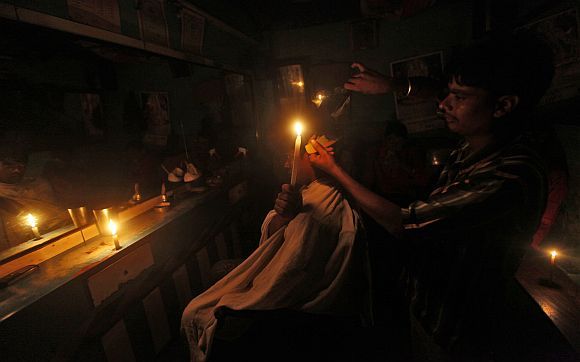Hard and unpopular decisions are needed - not just another round of financial repackaging to sort out the discom mess, says Vinayak Chatterjee.
 India's electricity distribution sector is a national embarrassment, brought about by decades of turning a blind eye to the misdemeanours of this sector.
India's electricity distribution sector is a national embarrassment, brought about by decades of turning a blind eye to the misdemeanours of this sector.
The unholy trinity of the conniving State Electricity Board (SEB) employee, the unethical and self-enriching domestic and industrial consumer and the politician patronising theft, corruption, sloth and freebies has brought the power sector to its knees.
A portrayal of the extent of decay is vividly presented in the Hindi documentary film Katiyabaaz (available on YouTube) that released in India on August 22, 2014.
Minister of State for Power, Coal and New and Renewable Energy Piyush Goyal, after having sorted out the coal and other sundry crises, is now faced with his biggest challenge: sorting out the discom mess.
And what a mess it is!
The thermal power sector is operating at a decadic low of 59 per cent plant load factor because discoms do not have the money to pay for buying more power.
Resorting to load-shedding is therefore the only practical way for discoms to stay operationally afloat.
This means that vast parts of the world's third-largest economic power goes without electricity for more than half the day.
As on March 31, 2014, SEBs had accumulated losses of around Rs 3.5 lakh crore. Experts say roughly 40 per cent of these losses are due to technical and commercial losses and the rest due to tariffs not keeping pace with rising costs of supply. According to the power minister, distribution utilities lose Rs 64,000 crore (Rs 640 billion) every year.
Discoms' collective debt is Rs 3.17 lakh crore as of June 2015 and increasing.
The central government has identified about Rs 1 lakh crore of this debt to be at risk, and ready to become the next tsunami of non-performing assets (NPA) to hit the already beleaguered banking system.
The Reserve Bank of India issued a red alert in June that the risk of discom NPAs was "very high".
It is common knowledge amongst energy sector aficionados that a slew of concurrent measures is needed to attack the cancer eating away the vitals of the energy distribution system.
One is network strengthening and rejuvenation. Thankfully, the central government's schemes of revamping rural networks under the Deen Dayal Upadhyaya Gram Jyoti Yojana and urban area networks under the Integrated Power Development Scheme (IPDS) are steps in the right direction, and are adequately backed by central funding.
Next, a 'smart metering' revolution needs to sweep through the country so that not a single power consumer is left 'unmetered'.
Depoliticising state regulators and associated tariff determination is critical. Further, all subsidies have to be to the account of the state government, and not on the books of the discoms.
Finally, 'carriage and content' needs to be split; where a recent report by the Forum of Regulators has laid out a three-stage implementation plan, which is likely to take five-seven years to implement. Hopefully, the 'Power for All' initiative being presented to various states, will be the platform to press for overhauling the distribution sector in real terms.
To Goyal's credit, he is certainly spending a large portion of his time with the states battling the 'Discom Dilemma'.
However, what is being crafted as a key intervention appears essentially to be another round of financial repackaging.
The discoms' debts are proposed to be transferred to the state governments concerned, which will issue bonds against these.
The Union Cabinet is shortly expected to endorse this. If the state defaults on servicing these bonds, the Centre would step in and commandeer parts of financial grants/devolutions to the state.
It is hoped that this additional pressure on the finances of the states will force them to implement tough distribution sector reforms.
That is indeed a fond hope. Transferring debt from a 100 per cent subsidiary to its parent is at one level financial jugglery masquerading as reform package.
It is evident that the Rs 10,000-crore (Rs 100 billion) 'Montek Bonds' of 2002 and the Rs 2-lakh-crore-plus Financial Restructuring Package for discoms of 2012 were not accompanied by proportionate changes in the efficiencies of the discoms.
Whilst banks and some central power sector lending public sector undertakings are thus being insulated against this potential tidal wave of NPAs, they may be compelled to subscribe to these new 'state power bonds' at an interest subvented rate of eight-nine per cent against typical bank loans at 12-13 per cent.
Clearly, state governments are being lured with this bait to sign up for this round of resetting.
So it is imperative that this latest round of financial 'barking' (at best, a short-term palliative) is accompanied by 'biting'. These bites have to be tough, hard and politically unpopular decisions.
What could these be?
Clearly, a 'sunset goalpost' where specific states are told that in a five to seven-year time frame, they need to achieve some pre-agreed technical, commercial and regulatory parameters, that is, an effective notice today to shut off all central government and banking sector funding for such states in future.
This, they can choose to achieve by revitalising their existing discom organisations or institute appropriate models of private sector involvement, including input franchisee, licensee or operating management.
Further, the central government can immediately consider setting up the much-discussed proposition of a National Power Distribution Company (NPDC) that begins to effectively challenge the hegemony of state-owned discoms.
More importantly, the NPDC can equally well fulfil other pressing objectives of picking up stranded capacity, price-pooling, and open-access.
We do not wish to have the next version of Katiyabaaz to be made at the national level.
The author is chairman, Feedback Infra.









